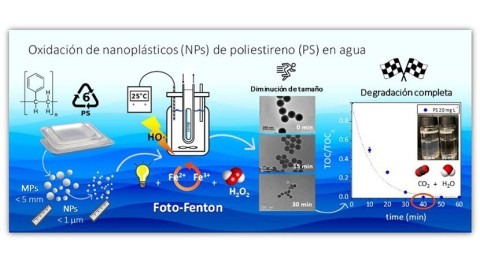A study carried out by more than a dozen Spanish research centers of the EnviroPlaNet Network, and led by the Autonomous University of Madrid (UAM) and the University of Alcalá (UAH), has found microplastics in drinking water in various regions of Spain. The results, published in Water Research, underscore the importance of proper waste management to prevent these pollutants from returning to our homes through the water we consume.

Sampling points and concentrations of microplastics (MPs) in the mains water of eight Spanish cities. Author: Roberto Rosal
Plastics have been found in almost every ecosystem on earth. Most plastics end up in the natural environment due to the mismanagement we make of our waste. Plastics reach our beaches and pollute our rivers. Once in the environment, they slowly degrade giving rise to smaller and smaller plastic particles that we call microplastics.
Microplastics measure less than 5 millimeters, which allows them to move easily through nature. Currently we can consider them ubiquitous pollutants since they are present in all environmental compartments.
Now, a study published in Water Research by the Red EnviroPlaNet research network has revealed the presence of microplastics in the drinking water of several Spanish cities. EnviroPlaNet coordinates the efforts of more than a dozen Spanish research groups that work on issues related to plastic pollution.
A study published in Water Research by the Red EnviroPlaNet research network has revealed the presence of microplastics in the drinking water of several Spanish cities
In addition to microplastics, the researchers also found man-made materials such as dyed cotton fibers from clothing, which are a potential source of additives such as dyes.
The average concentration of plastics was 12.5 ± 4.9 microplastics per cubic meter of water, while that of artificial materials was 32.2 ± 12.5 particles per cubic meter of water.
The main plastics detected were polyamides, polyesters and polyolefins, materials for general use in numerous commonly used objects and in textile garments.
The careful characterization of all the particles in the study allowed estimations of the mass of microplastics contained in the processed samples, the average of which was found to be 45.5 nanograms per liter.
“This is a small value and comparable with other contaminants that appear in surface water and that from there reach the network water, such as antibiotics. Consuming 1.5 L of water every day, it would take 40 years to get to ingesting 1 milligram, which most likely indicates that the risk to human health is negligible. This is good news”, the authors detail.
“Now, no matter how little there is, one does not expect plastic to come out of the tap. In our study it was shown that despite the fact that the mains water from the most populated area, Madrid, was the one that contained the most microplastics, plastic waste appeared in all the samples with a fairly similar concentration”.
The most probable origin is in the diffuse contamination that reaches the channels from which the drinking water treatment stations take water, which generally receive wastewater from treatment plants located upstream. Wastewater discharges, even if they are properly treated according to current parameters, are an important source of microplastics discharged into the environment.
"As a final reflection, it should be noted that the waste that we end up discarding in our homes ends up returning to them, hence the importance of correctly managing the waste that we generate", the authors conclude.




